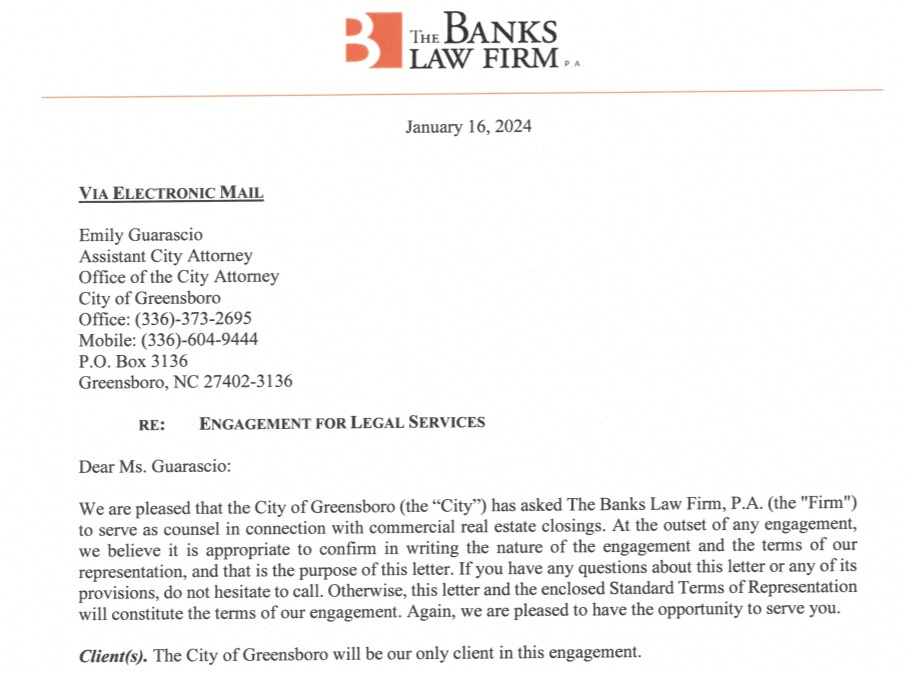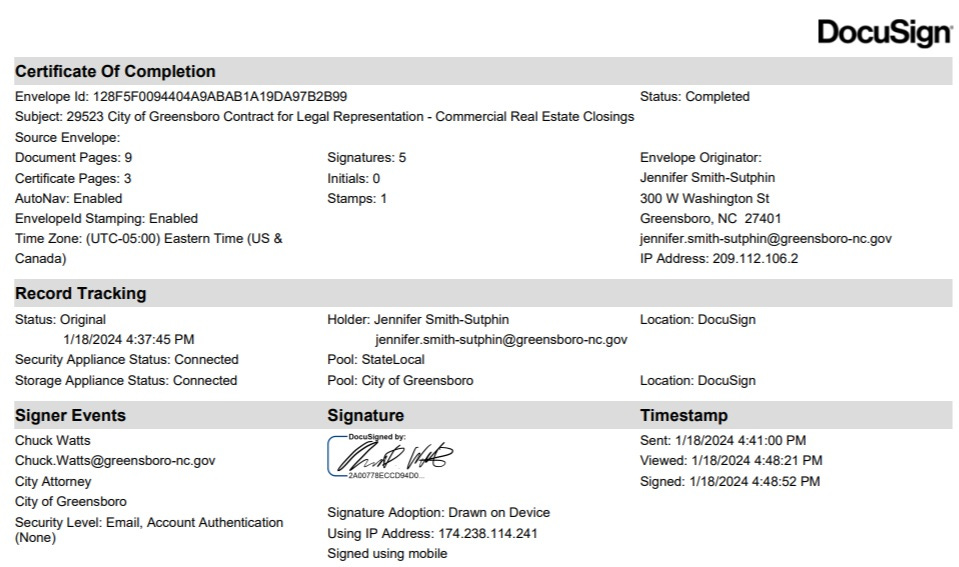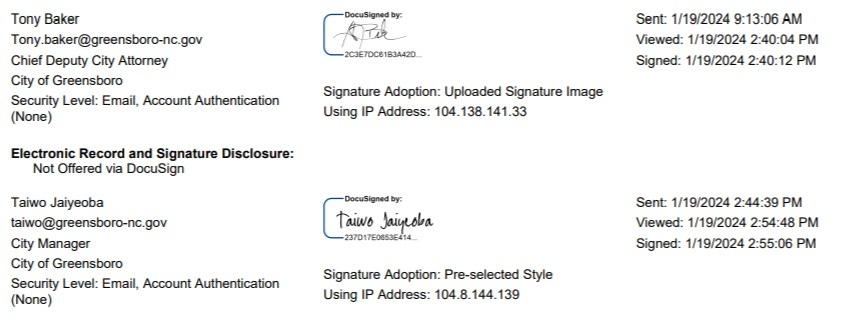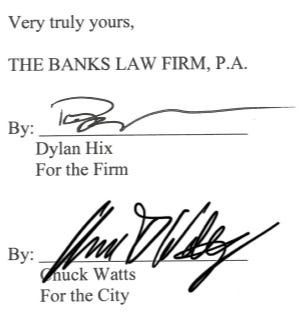Did Former Greensboro City Attorney Chuck Watts Create a State Bar Ethics Issue by Hiring The Banks Law Firm, His Former Partnership?
Recent events in Greensboro have raised critical ethical questions concerning the role of a City Attorney who formerly was a partner in a private law firm, and then, in his government capacity, caused that firm to be hired under multiple contracts with the city, particularly as he personally authorized the same contracts.
The situation implicates both statutory public‐contract law and the North Carolina Rules of Professional Conduct.
On July 2, City Attorney Chuck Watts suddenly retired.
Today, the City of Greensboro wrote "In response to your public records request concerning copies of all records, contracts, communications, invoices, memos, correspondence, and other materials related to the following payments made by the City of Greensboro to The Banks Law Firm, P.A., the Greensboro Legislative Department provides twelve contracts and responds, “The Legislative Department has no additional records responsive to this request.”
From a records request;
"Please provide the work product by The Banks Law Firm, P.A... related to records requests "31068 The Banks Law Firm and Chuck Watts", "31067 The Banks Law Firm, P.A."...
"Work product", in the context of a law firm’s services, refers to the professional output created by the firm’s attorneys and staff in the course of providing legal representation in exchange for compensation. It includes the research, analysis, drafting, correspondence, advice, and other tangible and intangible results of the firm’s legal work performed on behalf of a client."
No work product was produced by the city as asked for in the records request.
In July 2025, the City of Greensboro terminated two female legal department employees, Jennifer Smith-Sutphin and Shannon Stevens, citing the "mishandling of city resources". Smith-Sutphin sent the Docusign email for one of the contracts above.
Greensboro Treasury Disbursements Reports show;
1/16/2025 Parking Facilities Operatng Fd 494817 The Banks Law Firm PA Professional Services $15,711.20
7/25/2024 Community Developmt Block Grnt 489291 The Banks Law Firm PA Professional Services $10,511.28
8/3/2022 General Fund 461073 The Banks Law Firm PA Code enforcement litigation $10,899.33
7/29/2022 General Insurance Fund 460891 The Banks Law Firm PA Professional services $22,639.45
6/17/2022 **General Fund 459353 The Banks Law Firm PA Code enforcement litigation $15,138.70
**Denotes checks being paid from multiple funds
4/19/2022 General Fund *456855 The Banks Law Firm PA Legal services $46,437.42
*Denotes multiple checks included in figure
2/11/2022 **General Fund *454447 The Banks Law Firm PA Legal services $24,524.68
**Denotes checks being paid from multiple funds
Jennifer Smith-Sutphin’s termination letter suggested she "may have felt compelled to act" and pointed to the improper use of city resources. Smith-Sutphin reportedly raised an issue about a suspicious invoice prior to her firing.
On July 24, Chief Deputy City Attorney Tony Baker, who also authorized Banks Law contracts, resigned on the same day as the Smith-Sutphin and Stevens firings.
On August 21, in a email to Jason Hicks, newly appointed City Attorney Lora Cubbage wrote "We are in the process of completing review of the invoices paid to the Banks Law firm. The attorney(s) assigned to any matter(s) have confirmed that the invoices paid were for legitimate City business only. We are in the process of confirming the same with the departments from which the matter(s) originated."
And nothing since on work product. 25 days later.
My requests date back to late July;
31068, The Banks Law Firm and Chuck Watts, 07-30-2025
George Hartzman, Staff is searching for records. 4 weeks 5 days
31067, The Banks Law Firm, P.A., 07-30-2025
George Hartzman, Staff is searching for records. 4 weeks 5 days
The following have contributed to current City Attorney Lora Cubbage prior election campaigns; CHARLES WATTS, SKIP ALSTON, NANCY HOFFMANN, MARIKAY S ABUZUALTER, MARK CUMMINGS, THOMAS CARRUTHERS, NANCY VAUGHAN, SHARON CONTRERAS AND YVONNE JOHNSON
ANDREA HARRELL AND ROSETTA DAVIS from the City Attorney's Office also contributed to Cubbage’s candidate runs.
When Greensboro City Attorney Chuck Watts approved and signed contracts bringing in his former law firm to represent the City, the decision raised a serious professional ethics question: did this conduct run afoul of the North Carolina Rules of Professional Conduct?
Government lawyers, like private practitioners, are bound by the Rules of Professional Conduct. The most relevant provisions include:
Rule 1.7 (Conflict of Interest: Current Clients): prohibits representation where the lawyer’s personal interests materially limit professional judgment.
Rule 1.11 (Special Conflicts for Former and Current Government Officers and Employees): restricts lawyers moving between public service and private practice to prevent favoritism or undue influence.
Under these rules, the central concern is whether Watts’s prior role as a partner in The Banks Law Firm impaired his independence or created the appearance that public legal work was steered for private benefit. Even if no direct financial interest remained, the Rules emphasize that public trust in impartiality is paramount.
The Appearance of Impropriety
Citizens expect the City Attorney’s office to recommend outside counsel based on the City’s best interests, not loyalties. The fact that Watts had recently been a partner of the firm raises the appearance of impropriety, which can itself damage public confidence in municipal governance.
It is also not known whether there was any waiver, recusal, or City Council oversight regarding this arrangement.
The Open Legal Question
Separate from State Bar ethics rules, another layer of uncertainty comes from North Carolina law governing public contracts. Specifically, N.C. Gen. Stat. § 14-234 prohibits public officials from deriving a “direct benefit” from contracts they make or administer.
Whether Watts’s contracts with his former firm fall into that statutory prohibition depends on facts not yet public:
Did Watts retain any financial interest in the firm (ownership, profit-sharing, retirement payout)?
Did his role in signing the contracts constitute “administering” them under the statute?
If the answer to either question is yes, the statute suggests the contracts could be void, and a willful violation could even carry criminal liability.
The State Bar enforces professional ethics standards, but the statutory questions fall into a different arena, one of municipal law, contract law, and potentially criminal law. What’s clear is that the City Attorney’s professional obligations required him to avoid even the appearance of divided loyalties.
Even if the state law issues remain unsettled, the State Bar could view Watts’s actions as raising substantial ethics concerns under Rules 1.7 and 1.11. At a minimum, the situation highlights the importance of transparency and independent review when a government lawyer’s past and present affiliations overlap.
g
Disclaimer
1. Nature of Content; This article is an independent journalistic analysis and commentary based on publicly available records, including documents obtained through public records requests to the City of Greensboro. It examines facts and raises questions concerning matters of public interest, professional ethics, and municipal governance. The content is presented for informational and discursive purposes.
2. Presumption of Innocence & Allegations; This article discusses potential ethical and legal issues. It does not assert, and should not be interpreted as asserting, that any individual or entity named (including former City Attorney Chuck Watts, The Banks Law Firm P.A., or any current or former city officials) has engaged in unlawful or unethical conduct. All parties are presumed innocent of any wrongdoing unless and until proven otherwise through official, lawful proceedings.
3. Basis in Public Record; The financial figures, contract details, employment terminations, and timeline of events described are sourced from official city documents, such as Treasury Disbursement Reports, public records request responses, and official city correspondence, as cited within the article. The analysis and interpretation of these facts are those of the author.
4. Distinction Between Fact and Analysis
Readers should distinguish between; Reported Facts: Specific data points, dates, monetary figures, and documented statements from official sources.
Author’s Analysis; The ethical and legal questions posed, the application of North Carolina Rules of Professional Conduct (Rules 1.7, 1.11) and state statute (N.C. Gen. Stat. § 14-234), and the commentary on the “appearance of impropriety.” This analysis represents the author’s viewpoint based on the documented facts.
5. Ongoing Nature of Inquiry; The article references pending public records requests and notes the city’s ongoing internal review of the matter as of its publication date. The situation it describes may evolve, and subsequent information could provide additional context.
6. Campaign Contributions; The mention of campaign contributions to City Attorney Lora Cubbage by various individuals is a matter of public record from campaign finance filings. The article presents this information for contextual purposes; any implied connection to the subject matter is speculative and part of the author’s broader analytical narrative.
7. Right to Reply; The author has incorporated relevant statements obtained from city communications (e.g., the email from City Attorney Lora Cubbage dated August 21). This disclaimer serves as an open invitation to any named party to provide a further statement or clarification for the record, which may be included in future reporting.
8. No Legal Advice; This article is not legal advice. The discussion of ethics rules and statutes is informational. Readers should not construe it as a legal opinion or a definitive judgment on the matters discussed. Specific legal questions should be directed to a qualified attorney.
9. Commitment to Accuracy; Public Integrity Watch is committed to reporting based on documentary evidence. If any factual error is identified, we will correct it promptly and transparently upon verification.
10. Purpose; This investigative work is published in the public interest to promote transparency, accountability, and informed discourse regarding the conduct of public officials and the use of public resources.





